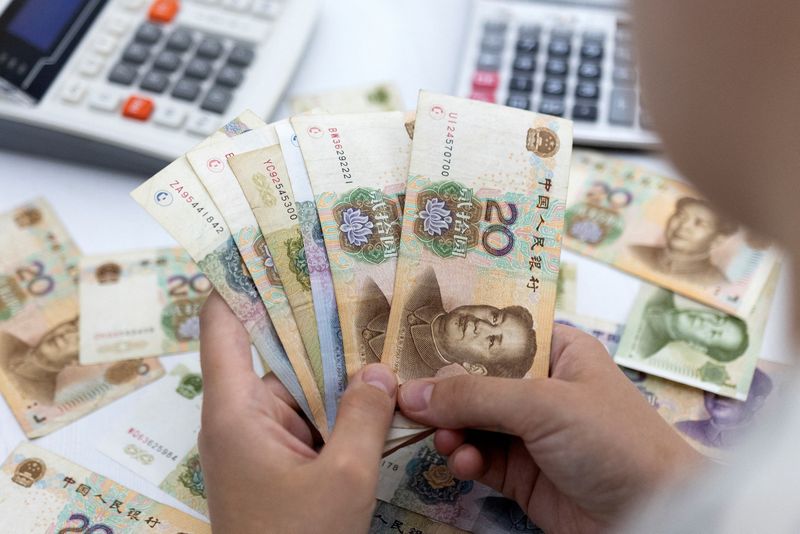By Kevin Yao and Ellen Zhang
BEIJING (Reuters) - Long-touted changes to China's tax system will focus on allowing local governments to retain more fiscal revenues, say policy advisers, widely seen by markets as an important step towards removing an immediate threat to financial stability.
Measures that redistribute income from central authorities to municipalities, curbing an addiction to land sales laid bare by China's property crisis, will top the agenda of a leadership gathering in July, known as the third plenum, they said.
"Pressure is high to push reforms to bolster local government revenue after the end of the land finance phase," said one of four policy advisers who spoke to Reuters. Three of them requested anonymity due to the sensitivity of the matter.
The plenum is set to discuss the biggest changes to China's fiscal system in three decades, with policymakers hoping to ease concerns over a $13 trillion-and-growing local government debt pile that poses risks to financial institutions and economic growth.
Details of the plans have been reported by Chinese media.
In 2023, local governments' own fiscal revenues accounted for 54% of the nation's total, but their expenditures accounted for 86%, data from the finance ministry showed.
This imbalance stems from the fiscal reforms of 1994, when China aimed to limit localities' capacity to independently raise money, following a surge in local spending and inflation in the late 1980s.
But local governments got around those limitations by creating off-budget financing vehicles - which Beijing is cracking down on - and by auctioning land for residential development, fuelling a giant housing bubble.
Land sales' contribution to local budgets rose from a fifth to almost a third in the decade leading up to 2021, when China entered a severe property market downturn. It is no longer a reliable cash cow: such incomes shrank to 5.8 trillion yuan ($780 billion) in 2023 from a 2021 peak of 8.7 trillion.
'MATURE SOCIETY'
Chinese leaders flagged plans for fiscal reforms at an annual meeting in December, without offering details.
Policy advisers said the main changes are likely to revolve around how much revenue local governments retain, rather than adding or hiking taxes.
Municipalities currently get half of value-added tax revenue and 40% of personal income tax, while the central government gets most corporate income tax and all of what China calls a consumption tax, currently levied on producers and importers.
The advisers did not give figures on the future division of tax income between central and local governments.
But they said local governments may be allowed to keep most of the consumption tax - which accounts for almost a tenth of China's total tax revenues - and more of the value-added tax - which accounts for more than a third.
Proposals also include Beijing taking over growing commitments on pensions and healthcare as the population ages.
The aim is to stop municipal debt accumulation by balancing revenues with expenditure, the advisers said.
"Local governments' spending should be based on their fiscal capacity," said a second adviser. "A mature society no longer needs to find special ways to build more infrastructure."
STILL IMBALANCED
The fiscal overhaul will likely stop short of addressing other structural imbalances, such as an over-reliance on investment and exports and weak household consumption, analysts say.
China taxes capital gains at 20%. While subject to many exemptions, it is also lower than the 30% in India and 37% in the United States.
But investment yields dwindling returns, as evidenced by debt significantly outgrowing China's gross domestic product (GDP) for the past 15 years.
Therefore, tax revenue is also low. The International Monetary Fund calculates China's tax-to-GDP ratio at 14%, versus a 23% average for the Group of Seven developed economies.
This makes social spending difficult to fund without raising taxes on capital or businesses. Taxing households more is a difficult proposition as China's upper personal income tax band is among the world's steepest, at 45%.
The difference between how capital and labour are taxed encourages low wages and high investment.
But reversing that runs counter to Beijing's strategic goals of global industrial and technological leadership, which channel resources to factories and science laboratories, rather than consumers.
"Tax reforms should support industrial development," said policy adviser Jia Kang, founding president of the China Academy of New Supply-Side Economics.
China still needed to "grow the pie," he added.
PLANTING SEEDS
Still, one seed for a longer-term tilt towards consumption may yet be planted at the plenum.
Chinese media said policymakers may shift the point of charging the consumption tax to wholesalers and retailers.
This tax currently only applies to 15 types of goods, from alcohol and tobacco, to luxury cars, jewellery and yachts. Domestic demand for these items has limited impact on China's productivity.
Goldman Sachs analysts say charging consumers shifts incentives for local officials from growing their manufacturing base to growing their consumer base.
But that would require a broader application of the tax at a time when consumption remains weak and the economy is fragile.
"Although there are compelling reasons for increasing the role of consumption tax," the analysts wrote, "implementation is likely to be incremental."
Similar constraints apply to adding a property tax.
China had long intended to introduce the levy to reduce the regressiveness of its tax regime, but the property crisis derailed those plans.

Jia said Beijing won't kick the sector while it's down: "We can move only at an appropriate opportunity."
($1 = 7.2564 Chinese yuan renminbi)